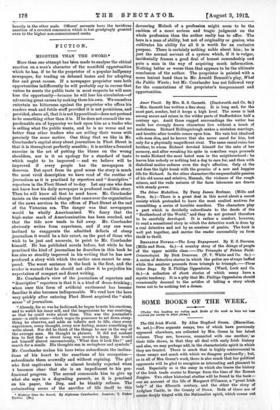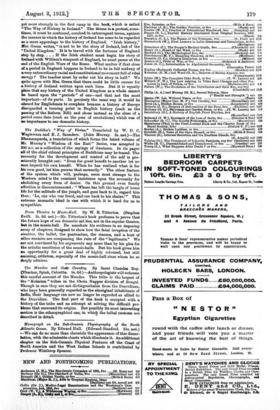SOME BOOKS OF THE WEEK.
[Under fhis heading we notice such Books of the week as hare not bus i curved for review in other fornu.1 The Old Irish World. By Alice Stopford Green. (Macmillan. 4e. net.)—Five separate essays, two of which have previously appeared elsewhere, are collected by Mrs. Green in her latest volume. They are, however, connected with one another,' as their title shows, in that they all deal with early Irish history and also, we may perhaps add, in the characteristic spirit in which they are treated. There is much that is highly controversial in these essays and much with which we disagree profoundly ; but, as in all of Mrs. Green's work, there is also much that her political opponents will be glad to recognize as interesting and pleasant to read. Especially so is the essay in which she traces the history of the Irish trade routes to Europe from the time of the Roman Empire. Two other historical studies will be found in the book— one an account of the life of Margaret O'Connor, a "great Irish lady" of the fifteenth century. and the other the story of Ardglass Castle, in the County of Down. Both of these are of course deeply tinged with the Nationalist spirit, which comes out yet more strongly in the first essay in the book, which is called "The Way of History in Ireland." The theme is a protest, some- times, it must be confessed, couched in extravagant terms, against the manner in which the history of Ireland has come to be regarded as a mere appendage to the history of England. " Irish history," Mrs. Green writes, " is not to be the story of Ireland, but of the 'United Kingdom.' It is to travel with the fortunes of England step by step. . . . If the Irish student must begin his story of Ireland with William's conquest of England, he must pause at the end of the English Wars of the Roses. What matter if that close of a period in England happens in Ireland to be in full midway of a very extraordinary racial and constitutional movement full of vital energy ? The teacher must by order cut his story in half." We quite agree with Mrs. Green that there could be little excuse for a history of Ireland 'written upon such lines. But it is equally plain that any history of the -United Kingdom as a whole cannot be based upon the "periods" of one—and that not the most important—of its parts. In precisely the same way it would be absurd for Englishmen to complain because a history of Europe disregarded a turning point in English history (such as the passing of the Reform Bill) and chose instead as the close of a period some date (such as the year of revolutions) which was of no importance to our domestic history.





































 Previous page
Previous page